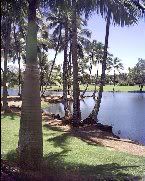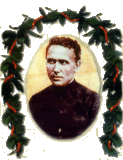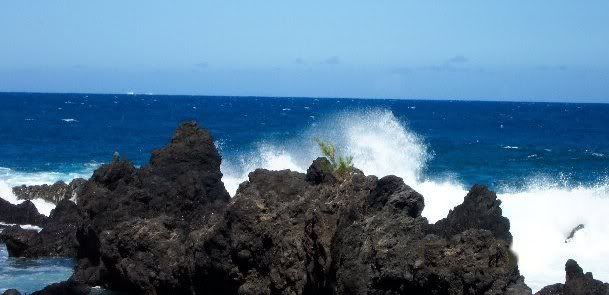

Name~ Hokule'a Kealoha
Short Bio~Hokule'a Kealoha is the Nom De Plume of a writer that formerly lived in Hawaii and is now living a life of adventure on the highways and byways of the American South . I am a Born Again follower of Jesus, as well as a wife, mother of cats and dogs,jeweler, entreprenuer, photographer and pilgrim...
Age~ Old enough to know better
Status~ Newly Single after 13 years of marriage,fur mom to the loving and devoted mini ShihTzu doggie Annabelle, born 6-11-2007 RIP 2-25-09, and the beautiful Abigail born 2-14-09
Hair Color~ natural brown/grey
Mood~ I ALWAYS have a mood, try me...
Loving~ Jesus, Hawaii, my furry friend, Abigail, my Pen Pals, Jewelry ,Blogging ,Writing anything,my Ipod,and being outdoors surrounded by my wonderful natural surroundings
Hating~ Boom Box Cars, Earspray, Abuse of Power,
Reading~
Bible
Magnificat
Link
Link
Underwired! Louisville's magazine for Women
In Store~The Magazine for the American Jeweler
Books in Progress...
CATECHISM OF THE CATHOLIC CHURCH
"Link"
"Link"
Just Finished Reading
"Link"
Link
Link
Link
Jesus, Divine Mercy ~

I Trust In You~
My Favorite Past Posts~Relive The Journey!~
2009~
Link
Link
Link
Link
Link
Link
Link
Link
2008~
Be Thankful
Colateral Damage
Make Lemonade
Home Is Where The Heart Is
The Poor With Us
Because Its The Hardest Thing I Can Do
We Have All Become Victims
Lest I Forget
The Most Important Words
Family Values
Familiar Places
May Perpetual Light Shine On Them
A City In Motion
2007~
The Quiet Storm
Fellowship of the Cane
Like Dead Unremembered: A 9-11 Tribute
The Medicine Machine
One Giant Leap
In The Steps of St. Francis
Too Much Information
The Un Choice
2006~
The Holly and the Ivy
The First 9-11, Dec 7,1941
Small Moments of Silence
Peaches to Winnipeg
Dreaming of Hawaii
Memorial Day
Scattered Values
The White Line is the Lifeline for the Nation
Warnings of a New Civil War
I Will Be True To The Promise I Have Made
The Snowy Bloody Day
Cats in the Cradle
2005~
The Journey
Rebirth of a City
For Posterity's Sake
The New Civil War
Every Mother's Son
And There You Stayed, Temporarily Lost at Sea
The Lone Rider
The Bible Is Not the Fourth Member of the Trinity
Rome Wasn't Built With Union Labor
Happy Birthday Mom ~revised~
A Beautiful Noise
Even Now
The Wearing of the Red
Night Ranger
The Joyful Traveler
Hoiliili "To Gather Up"
Ke Makakilo (My Observations)
He Giveth Sleep
Save The Children
2004~
Lux Aeterna
December 2004
You're Joking, Right?
Ground Zero
I Am Not A Failure
O,To Grace, How Great A Debtor
Lost In Translation
One Small Step for Man
The Rainbow's End
Profanity
Taps
The Journey
Makoa's Song
No Aloha For The Weakest
The Paradoxical Comandments
The Time Is Now
2003~
When No Fruit Is On The Vine


St. Edith Stein~Pray for Us
Religion Link List~
My Secret is Mine
Ignatius Insight-Online Magazine
Fr John Corapi SOLT
Dr. Scott Hahn St Paul Center
Fr. Mitch Pacwa~ Ignatius Productions
Link
Link
Link
Link
Link
Political Link List~
Link
Link
Link
link
Arkansas Link List~
Little Portion Hermitage
John Michael Talbot website
John Michael Talbot Myspace page
1st United Methodist Church Bella Vista
Northwest Arkansas Guide
Mimi's Cafe
Metro Woman Business Directory of NW Arkansas
River Grille
Link
Link
Link
Interactive Links~
Live WebCam Feed from the Mauna Lani Resort, Kohalla, Big Island of Hawaii
Click here for Aloha Joe!Live Hawaiian Music 24/7

St. Damien of Molokai'i, Patron of Hawaii and the Outcasts among us, pray for us....

Hawaii Links~ ~
For more Hawaii links Click Here
Volcano Updates (Pele's Mood Meter)Hawaii Volcano Observatory
Hawaii Volcanoes National Park
Volcano Watch Archives
Mauna Kea Observatory
Pacific Tsunami Museum
Link
Link
Link
Link
Technorotica for Blogging~




Who Links Here...Click here to see who's linking to this site. Powered by WhoLinksToMe.com
Globe of Blogs~Blog search engine
The Blog Search Engine
stock xchng
Photobucket
BlogSkins
Link
Wikipedia
Nuzio's Place on the Web
Commutefaster.com
PING ME!
MWBS Wordpress Edition
Link
Technorotica for Jewelers, and the Jewelry Trade~
Gemological Institute of America
The Drouhard National Jewelers School
The Conner School
Link
Link
|
November 14, 2004
 The Pu'ukohola Heiau, near Kawaihae, Kohalla Dedicated to the war God Ku, this was the last of the large "heiau" or temples built by royal command. King Kamehameha was said to be ordered by the gods to build this and sacrifice (humans), to Ku, for doing this he would be given control of all of the Hawaiian Islands. This huge structure built by slave labor was compleated in two years by continous round the clock labor. Stones were passed hand to hand from Waikoloa 20 miles away. The king and his cheifs worked along side the slaves. It is estimated that nearly 3000 people were sacrificed at the dedication ceremonies.
Pepetuated In Righteousness Day One cont
Pa'ao, as the high priest of the new royalty also became powerful. To consolidate his power, pa'ao instituted human sacrifices and changed the Hawaiians' religious rituals. He built the first laukini (human sacrifice) heiau (temple) on the Big Island (Hawai'i) at Waha'ula. Fornander wrote that " . . . there was a time before that, when human sacrifices were not only not of common occurrence, and an established rule, but were absolutely prohibited. Kapu ke kanaka na Kane, 'sacred is the man to Kane' . . . "
Pa'ao instituted the oppressive kapu (tapu or taboo) system and the worship of elemental spirit gods such as Pele. Fornander says that Pele worship in Hawai'i is only subsequent to this migratory period. The Pele cult was unknown to the purer faith of the older inhabitants and her name does not even appear in the creation accounts.
Pa'ao also changed the benign god, Ku, into a vengeful and bloodthirsty god of war. He also brought the Kanaloa (Tangaloa) Cult from Tahiti, elevating Kanaloa to a major creation god. The class separation between the Ali'i with their mana and the common Hawaiian again became a huge gulf.
Fornander wrote, "In the polity of government initiated during this period, and strengthened as ages rolled on, may be noted the hardening and confirming the divisions of society, the exaltation of the nobles and the increase of their prerogatives, the separation and immunity of the priestly order, and the systematic setting down, if not actual debasement of the commoners, the Maka'ainana."
What most people today regard as the religious system of the old Hawaiian people, was not their true religion --- it was a foreign religion introduced by the invader Pa'ao.
Pa'ao's voyages from Tahiti were the last from other Polynesian islands. The 19th century Tahitian scholar, Teuira Henry, wrote that there formerly was an alliance of Polynesian nations which ended around 600 years ago. This alliance ended because of a dispute at an international meeting of navigators. He said that at the great marae (temple) of taputapuatea in Raiates, a Maori was murdered and a curse was put on the marae by one of their priests. Navigators from the different Polynesian nations never met again. By the time Captain Cook arrived, voyaging canoes were only a dim and distant memory.
THE KAPU SYSTEM
The ali'i convinced the common people that they had inherited divine power (mana) and were divinely chosen by the gods to rule. The kapu system was structured around the concept of protecting the mana. Complex kapus (laws) had to be kept to keep the mana intact and maintain its balance in nature for the land to be fruitful. Every aspect of Hawaiian life was controlled by strict requirements to maintain the balance and harmony of the mana. While there were many laws that encouraged the wise use of resources, and so forth, the social/political aspects of the kapu system provided an open door for abuse. Although ali'i usually kept the kapus, they did this because the belief in mana and the kapus was what kept them in power. High ali'i were never put to death for breaking kapus, although commoners were sometimes sacrificed to correct the "imbalance in the mana" caused by an ali'i's sin.
The Hawaiian people endured much suffering and bondage under this new religious system. The ali'i and kahuna had total power in this system and the common people had no control or say about who came to power. It was very rare indeed for the common people to overthrow an ali'i, and only another ali'i could take his place. Although there were exemptions, the majority of the ali'i and kahunas used their power for personal gain and not for the good of the people. The kapu system was used to keep control and wealth within the select ali'i/kahuna group. Laws strictly controlled every aspect of life.
For instance, kapus dictated that men and women had to eat separately and were restricted to only certain foods. Common women faced death for eating bananas, coconuts and other foods. Common men also faced death for eating certain fish and other foods. If a commoner stepped on an ali'i's land (even if the boundary was not well marked), or if an ali'i's shadow fell on him, he was also put to death.
An ali'i could take commoners who committed any of these "sins" and use them for human sacrifice or even bait for shark hunting. There were ovens for burning humans at Punchbowl and Waikiki. Commoners were drowned at Kewalo Basin (Honolulu) for breaking kapus. Human heads, of those offered in sacrifice, were put on stakes that lined the Pakaka temple at the foot of Fort Street (Downtown Honolulu). At the heiau located at the foot of Diamond Head, men had their limbs broken with clubs, their eyes scooped out, and then were left bleeding and maimed for three days. They were later clubbed to death with blows to the shoulders rather than to the head, thus prolonging the suffering before death.
The common people owned no land under the new religious system, in fact, they had no rights and nothing they could call their own. An ali'i could take anything he wanted from a commoner: his food, his belongings, his favorite pig, his children, or even his wife. The ali'i could "tax" most of a commoner's food away and force him to work on his building projects. It is estimated that two-thirds of what the common people produced was taken by high ali'i, chiefs and kahunas. In fact, the common people were so maltreated that when the first anthropologists arrived, they thought that the Hawaiians were comprised of two different races - the huge ali'i and the scrawny common people!
Sometimes the kapus were bent to show "mercy", if one could call it that. A five year old girl who are a banana was treated "mercifully" by the kahunas; they didn't kill her but only scooped out one of her eyes. When the high ali'i, Kapi'olani, was a young girl, she ate a banana. Because she was a high ali'i, they did not put her to death. Instead, the kahuna took her favorite servant, a child, and strangled him on the altar of the heiau instead. Many years later, Kapi'olani asked the kahuna who had strangled her young friend why he had done this. The kahuna replied, "Those were dark days, though we priests knew better all the time.” The kahuna continued, "It was power we sought over the minds of the people, to influence and control them." Kapi'olani cried out, "Oh why did not the Christians come sooner and teach us better things!' She then hid her face in her hands and wept.
One of the most shocking revelations to this author has been that Pa'ao, and his Tahitian kahuna and ali'i, knew about 'Io! Considering this, the words of the Kapi'olani's kahuna spoke are even more grievous --- ". . . we priests knew better all the time. It was power we sought over the minds of the people, to influence and control them.”
Even after Western contact, the common people were forced to harvest sandalwood like slaves until their bodies became deformed from carrying the heavy logs. A famine arose when thousands of commoners, forced by the ali'i to harvest sandalwood, could not tend their farms
THE GOD KU
Not only were these harsh requirements put on the common people but they were constantly drafted into armies to fight when the ali'i wanted more power. Captured commoners were used as slaves or for sacrifice. The Hawaiian people were also decimated by these wars. By the time of Kamehameha, there had been some 300 years of nearly constant warfare.
John Young, Kamehameha's trusted foreign advisor, said in 1826 of the conditions he had observed during his forty-nine years in Hawaii, "I have known thousands of defenseless human beings cruelly massacred in their exterminating wars. I have seen multitudes . . . offered in sacrifice to their idol gods . . . "
The god Ku, and the new system, had severely oppressed the Hawaiian people.
Through all this oppression, the common people, the maka'ainana, retained great Aloha in their hearts. Their time of freedom from this oppressive system and cruel gods was soon to come.
KAMEHAMEHA
A young warrior named Kamehameha rose from the ranks of the ali'i. He used the technology of the white man to conquer and unify the islands of Hawai'i. By unifying the Hawaiian Islands, King Kamehameha played a vital role in the maka'ainanas' coming freedom from the kapu system.
|
|
